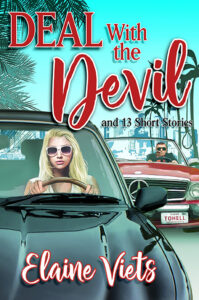 A novel’s opening chapter makes a promise, a secret vow that says, “This is what you can expect from me.”
A novel’s opening chapter makes a promise, a secret vow that says, “This is what you can expect from me.”
The chapters that follow better fulfill that promise, or the author will suffer the consequences with low-ratings, bad reviews, or their name on the Don’t Not Read list.
Yes, the promise is that important. It’s how we build and maintain an audience. It’s how we climb the proverbial ladder of success. It’s how we keep readers hungering for more. This solemn vow can NEVER be broken.
So far this month I’ve read three novels (all 5 stars). I average about one novel per week, along with nonfiction (craft books or true crime). None of my recent reads landed within my preferred genres of psychological thrillers, dark & gritty mysteries, and serial killer thrillers, but I feel it’s important for writers to venture outside their genres from time to time.
For my next read, I wavered between WIN by Harlen Coben or Book 2 of a serial killer thriller series from one of my auto-buy authors. I devoured Book 1 in a couple days, and I’d been dyin’ to read Book 2 for a while now, so I bought the $9.99 ebook. Immediately, the author transported me to a serial killer’s lair with the protagonist bound and helpless. I was enthralled. As I said, I’d been looking forward to this novel for a while and the opener didn’t disappoint.
Without sharing the title, I’ll show you how the writer sucked me into the scene.
Darkness.
It swirled around him deep and thick, eating the light and leaving nothing behind but an inky void. A fog choked his thoughts—the words tried to come together, tried to form a cohesive sentence, to find meaning, but the moment they seemed close, they were swallowed up and gone, replaced by a growing sense of dread, a feeling of heaviness—his body sinking into the murky depths of a long-forgotten body of water.
Moist scent.
Mildew.
Damp.
[Protagonist] wanted to open his eyes.
Had to open his eyes.
They fought him though, held tight.
His head ached, throbbed.
A pulsing pain behind his right ear—at his temple too.
“Try not to move, [Protagonist’s name]. Wouldn’t want you to get sick.”
The voice was distant, muffled, familiar.
[Protagonist] was lying down.
Cold steel beneath the tips of his fingers.
He remembered the shot then. A needle at the base of his neck, a quick stab, cold liquid rushing under his skin into the muscle, then—
Gripping, tense, love the story rhythm, the way he pauses at just the right moment. I could not flip the pages fast enough. Lovin’ every second of it!
And then…
In the next chapter, I find out it was all a dream. Infuriated, I almost whipped my Kindle across the room. One of my auto-buy authors wrote this thriller, and I expected him to fulfill the promise he made to me. Instead, he cheated. I was so disappointed, I refused to keep reading. He’d broken my trust. He let me down.
Sounds harsh, doesn’t it? But that’s exactly how I felt.
The emptiness he inflicted left me hungering for a visceral, gritty, serial killer thriller, one that would fulfill its promise.
I downloaded thriller number two.
Without revealing the title or author, here’s a small sampling of that opener.
I woke up from a gentle shake. My sister’s face hovered a few inches above mine, her eyes glistening wet. A grinding sound came from her jaw as it moved back and forth.
I shivered.
[Sister] put her fingers against my lips. “SSSH. Nod if you understand,” she whispered.
I nodded.
My room was freezing from the cold wind blowing in through my open window.
“The monsters are coming for us. Be very quiet. We’re escaping,” she whispered.
I nodded again, biting my lip hard to not cry.
Was there a monster in my closet? Behind my closed bedroom door?
My heart thrashed against my ribs like a bird trying to escape its cage. Why were the monsters after us?
We learn the protagonist is a child and her older sister is rescuing her from an imminent threat. Other than a few writing tics, like SSSH instead of Shh…, the author did a terrific job of showing the action. Finally, I could sink into a gripping read. Or so I thought.
The next chapter (Ch. 1) consisted of pages and pages of backstory. No plot, only backstory. The premise still intrigued me, so I kept reading. Then I hit a flashback that dragged on for several pages. The worst part? It added nothing to the main storyline.
Still, because the prologue was so good, I read on. The prologue had raised many, many story questions, and I wanted answers. But in Chapter 2, I read more pages and pages of backstory and another flashback. The next chapter was equally disappointing, with more pages of backstory and a third (fourth?) flashback. I lost count.
Whiplashed from being thrown forward, then backward, I couldn’t take it anymore and closed the book. A good premise will only take you so far. At some point, you need to deliver on the promise you made to the reader.
The third novel I bought—all in same day, I might add—began with a slow burn opener. A girl is emptying a bucket of oil into the dumpster behind Burger King. It doesn’t sound like much on the surface, but the co-authors held my interest. Which, after being burned twice in a matter of hours, wasn’t an easy task.
Here’s the opening of DEAD END GIRL by L.T. Vargus & Tim McBain:
Corduroy pants swished between Teresa’s thighs as she crossed the parking lot. She had a headache. That drive-thru headset gave her a headache every damn time. The band squeezed her skull like an old man trying to find a ripe cantaloupe in the produce department. Pressing and pressing until her temples throbbed. When the headaches were really bad, she got the aura. And it was gonna be a bad one tonight. She could already tell.
By the time she got home, she’d be nauseous from the skull throb along with the stink of fryer grease clinging to her clothes and hair and skin. Sometimes she swore she could feel it permeating her pores.
She placed a hand under the lid of the dumpster and lifted. The overhead lights in the parking lot glinted on the surface below. It looked like water, but it wasn’t. It was oil. Every night they emptied the fryers, dumping the used oil into this dumpster. It was a disgusting task. Worse than taking out the trash on a 90-degree summer day, when the flies got real thick, and the meat went rancid almost as soon as they put it in the bin.
It was dead out. No traffic. No noise at all but her fiddling with the dumpster and the bucket.
Her skin crawled a little whenever she was out here this late. In the dark. In the quiet. A feeling settled into the flesh on her back and shoulders, a cold feeling, a feeling like after watching one of those scary movies when she was a teenager. It might have been a thrill while she was watching, but later on that night she’d always get spooked. She’d tremble in bed, too terrified to walk down the hall to pee. The house never seemed so ominously still as it did on those nights. Anyhow, she couldn’t stand to watch horror movies anymore. Her weak stomach couldn’t handle the gore.
Bending over the metal cart she’d wheeled along with her, Teresa scooped one of the buckets of used fryer oil and balanced it on the edge of the dumpster. She tipped the bucket and watched as the gallons of brown grease oozed into the dumpster, disrupting the smoothness.
Settled at the bottom of the bucket, there were clumps and chunks. Burned bits of fries and chicken tender crumbs. They splatted and splashed into the pool of liquid that looked black in the night.
That’s when Teresa saw it. Something rising out of the oil, disturbing the otherwise unblemished surface.
Intriguing, right? Most importantly, the authors kept their promise. Elated, I could not flip pages fast enough, savoring favorite passages, the story rhythm and pace pitch-perfect. And now, I have a new favorite series. 🙂
Come morning, I felt bad about dissin’ my auto-buy author. Maybe he had a reason to break the don’t-open-with-a-dream rule. Could the last line of the first paragraph indicate a dream?
…his body sinking into the murky depths of a long-forgotten body of water.
In hindsight, maybe. Probably. But it’s too subtle. Nonetheless, I grabbed my Kindle and kept reading. Sure enough, he used the dream sequence to show the affect it had on the protagonist, who’s been suffering nightmares after a serial killer slipped through his grasp. The dream relates to the plot because that serial killer is back.
Do I agree with the dream opening? No, but I’ll keep reading because I know this author delivers each and every time and his writing speaks to me. But what if I wasn’t a fan? What if I’d chosen the book at random? He would’ve lost me. See what I’m sayin’? It’s a risky move.
We spend a lot of time perfecting our opening pages, polishing them till they shine, but our job doesn’t end there. We must follow through in subsequent chapters by setting up scenes, paying them off, setting up more, paying off more.
Other than that crucial promise, your solemn vow to the reader, a few other takeaways are…
- Don’t start with a dream sequence unless the reader knows it’s a dream AND you’ve got a damn good reason to do it.
- Go easy with backstory. Sprinkled it in over time.
- Avoid flashbacks unless they’re absolutely necessary. Most times they’re not.
- Don’t tell the reader what happened in the past. Trust us to figure it out on our own.
- A great premise only works if you deliver on that promise.
- If a slow burn opener works for your story, use it. Every novel doesn’t need a lightning-fast opener to draw and hold interest.
If you missed Jim’s post yesterday, read it (and the comment section!) for speed bumps that stop the reader.
How many chapters do you read before giving up on a novel?
His name is Paradox and he poses his victims in RED cocktail dresses, RED roses replace the eyes, and their hands hold a riddle wrapped in RED satin. He will kill again if his cryptic clues aren’t solved within 24 hours.
Can Niko and Sage stop him before the clock runs out? Click here to look Inside SCATHED.

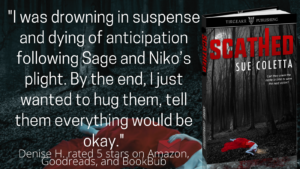

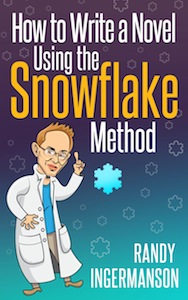
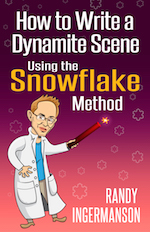
 When I’m not reading or watching true crime or nature/wildlife documentaries, I search for net-streaming series based on novels. Why? Because they’re the next best thing to reading, if the series preserves the craft beneath the storyline. Harlan Coben’s STAY CLOSE on Netflix is the perfect example.
When I’m not reading or watching true crime or nature/wildlife documentaries, I search for net-streaming series based on novels. Why? Because they’re the next best thing to reading, if the series preserves the craft beneath the storyline. Harlan Coben’s STAY CLOSE on Netflix is the perfect example.
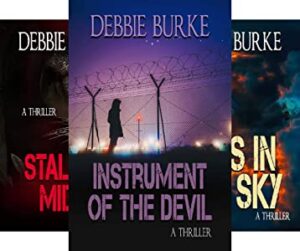
 By Elaine Viets
By Elaine Viets
 Want to go trendy? For a while every third book had “Girl” in the title. That trend started with novels like Gillian Flynn’s Gone Girl and Paula Hawkins’ The Girl on the Train, not to mention The Girls With the Dragon Tattoo by Stieg Larsson. None of these women were the girl next door, but their books sold. By the way, The Girl Next Door was used by a wide range of writers, from Brad Parks to Ruth Rendall. It’s even a horror story.
Want to go trendy? For a while every third book had “Girl” in the title. That trend started with novels like Gillian Flynn’s Gone Girl and Paula Hawkins’ The Girl on the Train, not to mention The Girls With the Dragon Tattoo by Stieg Larsson. None of these women were the girl next door, but their books sold. By the way, The Girl Next Door was used by a wide range of writers, from Brad Parks to Ruth Rendall. It’s even a horror story.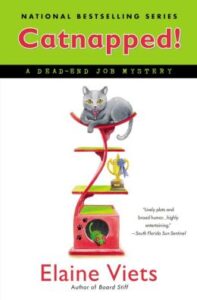
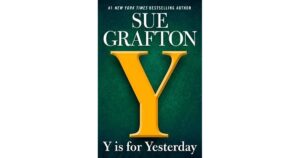 Series titles: Sue Grafton has her alphabet series, beginning with A Is for Alibi and ending with Y Is for Yesterday. Mary Higgins Clark and her partner-in-crime Alafair Burke have a song title series, starting with You Don’t Own Me. Stephanie Plum uses numbers. Her latest is Game on: Tempting Twenty-eight.
Series titles: Sue Grafton has her alphabet series, beginning with A Is for Alibi and ending with Y Is for Yesterday. Mary Higgins Clark and her partner-in-crime Alafair Burke have a song title series, starting with You Don’t Own Me. Stephanie Plum uses numbers. Her latest is Game on: Tempting Twenty-eight.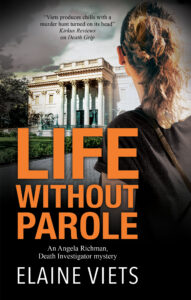 Enter to win a free copy of Life Without Parole, my latest Angela Richman, death investigator mystery. Stop by Kings River Life magazine:
Enter to win a free copy of Life Without Parole, my latest Angela Richman, death investigator mystery. Stop by Kings River Life magazine:  Those dang pesky buggers that sneak into first drafts and weaken the writing are called filler words and phrases—also known as fluff.
Those dang pesky buggers that sneak into first drafts and weaken the writing are called filler words and phrases—also known as fluff.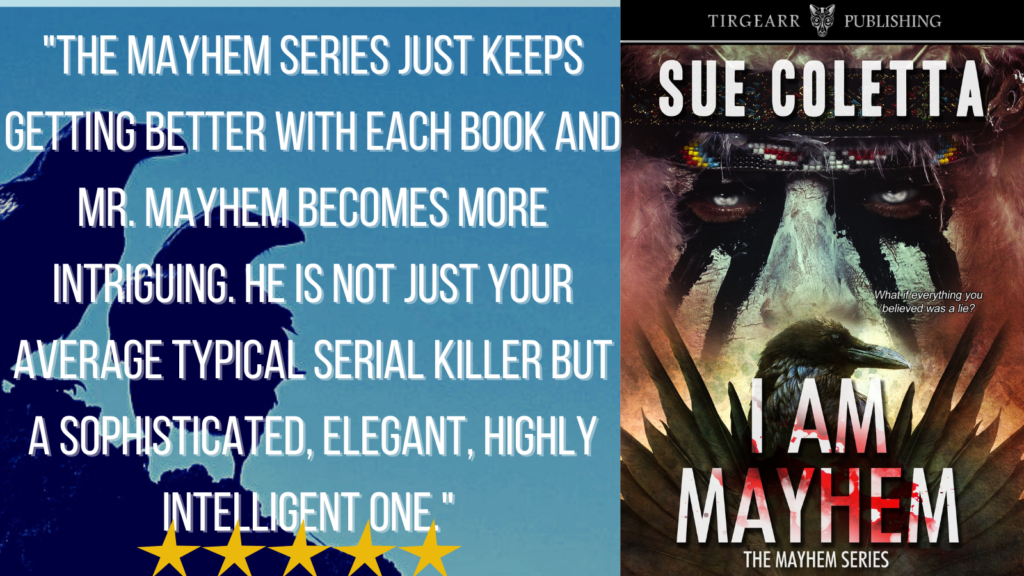
 Misdirection is the intentional deflection of attention for the purpose of disguise, and it’s a vital literary device. To plant and disguise a clue so the reader doesn’t realize its importance takes time and finesse.
Misdirection is the intentional deflection of attention for the purpose of disguise, and it’s a vital literary device. To plant and disguise a clue so the reader doesn’t realize its importance takes time and finesse.
 Character misdirection is when the protagonist (and reader) believes a secondary character fulfills one role when, in fact, he fulfills the opposite.
Character misdirection is when the protagonist (and reader) believes a secondary character fulfills one role when, in fact, he fulfills the opposite.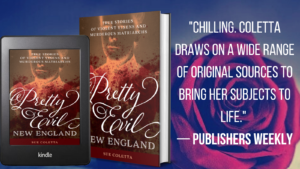 Female killers are often portrayed as caricatures: Black Widows, Angels of Death, or Femme Fatales. But the real stories of these women are much more complex. In Pretty Evil New England, true crime author Sue Coletta tells the story of these five women, from broken childhoods to first brushes with death, and she examines the overwhelming urges that propelled these women to take the lives of more than one-hundred innocent victims. If you enjoy narrative nonfiction/true crime,
Female killers are often portrayed as caricatures: Black Widows, Angels of Death, or Femme Fatales. But the real stories of these women are much more complex. In Pretty Evil New England, true crime author Sue Coletta tells the story of these five women, from broken childhoods to first brushes with death, and she examines the overwhelming urges that propelled these women to take the lives of more than one-hundred innocent victims. If you enjoy narrative nonfiction/true crime,  Did you ever say this? “I’m trying to write a short story, but I’m blocked. I’m getting nowhere.”
Did you ever say this? “I’m trying to write a short story, but I’m blocked. I’m getting nowhere.”
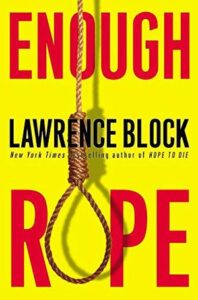 “This Crazy Business of Ours”
“This Crazy Business of Ours”


 – No more stories about husbands who kill wives, or vice versa.
– No more stories about husbands who kill wives, or vice versa.